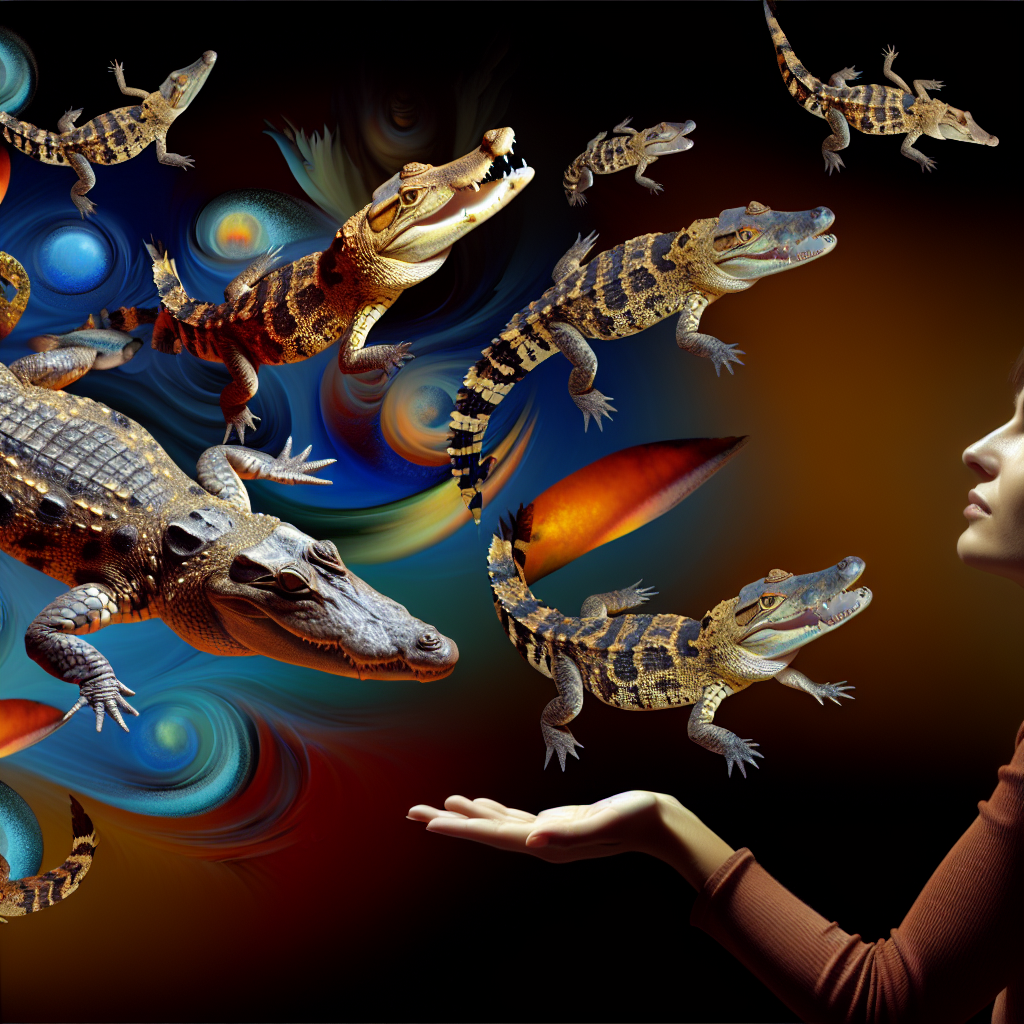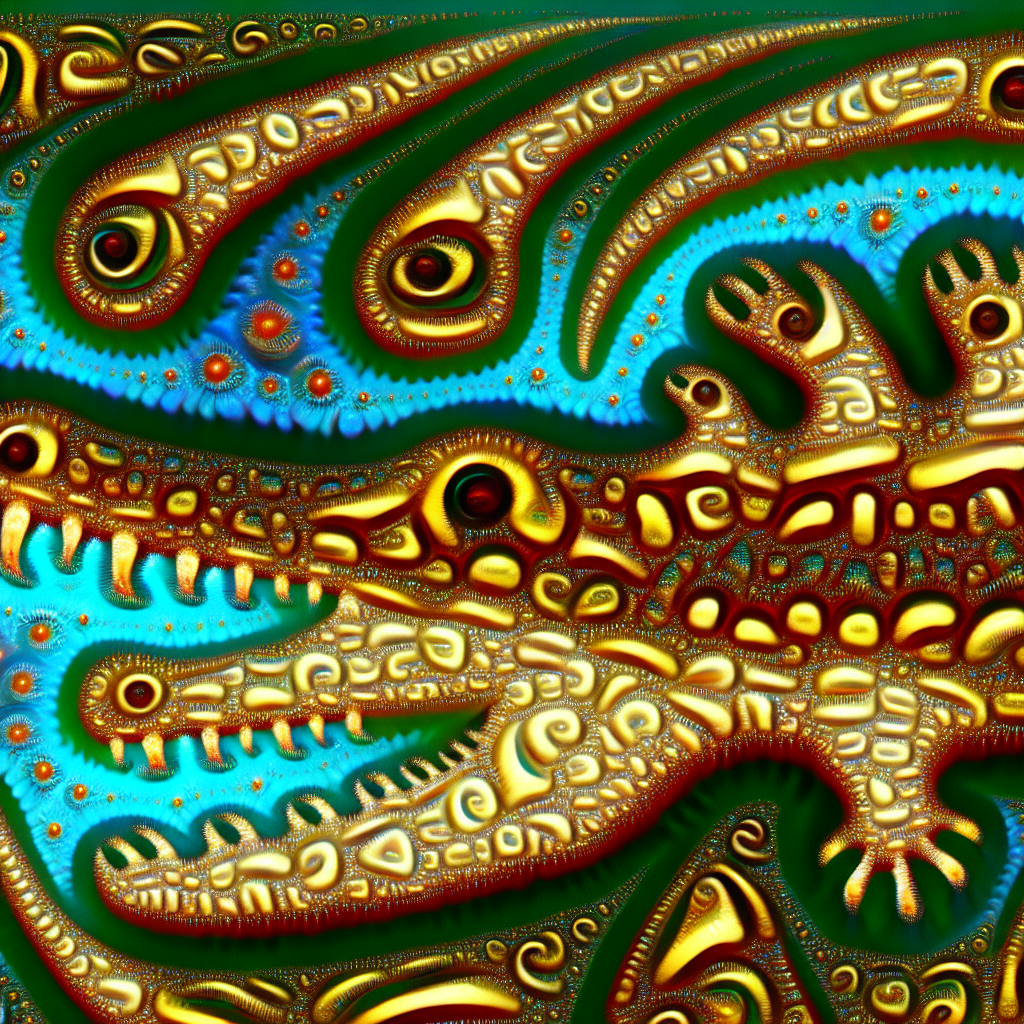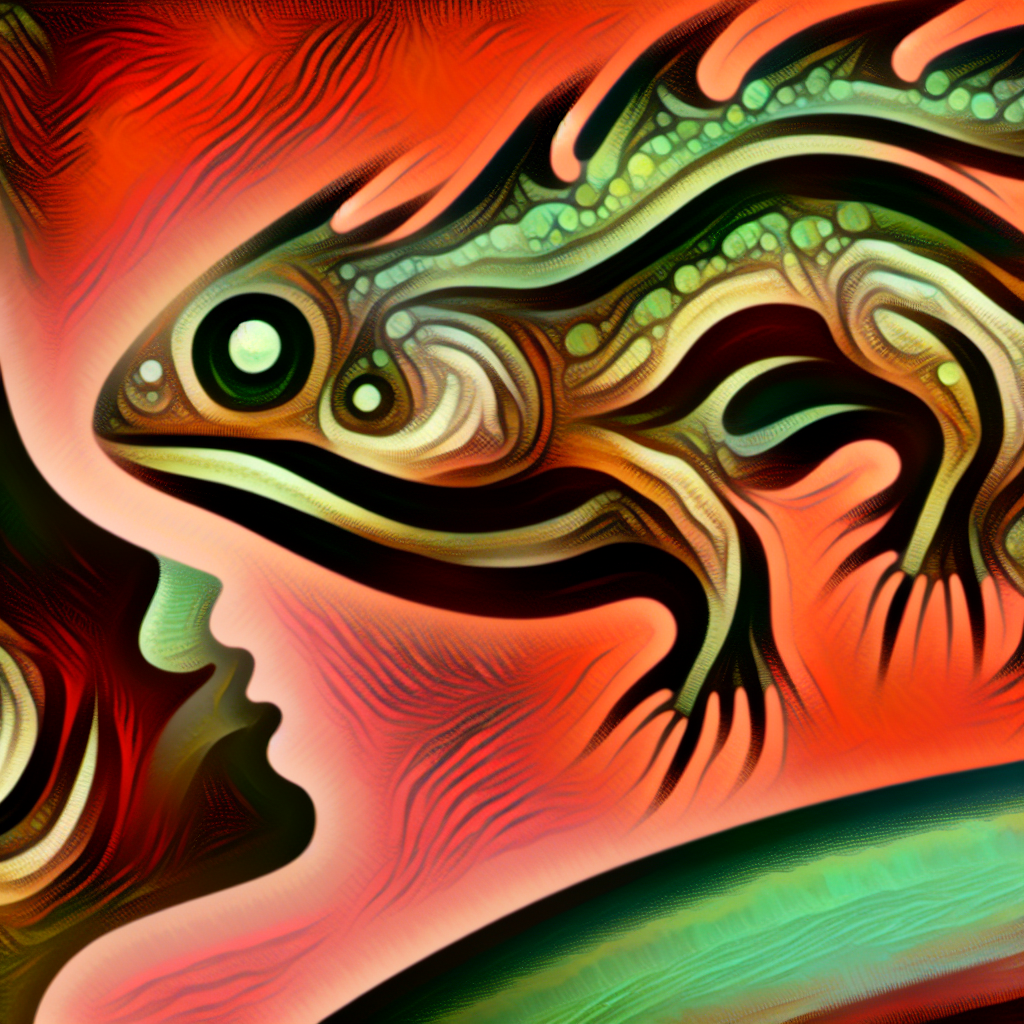
Understanding the Dream of Being Eaten by a Crocodile: Symbolism and Insights
What Does It Mean to Dream of Being Eaten by a Crocodile?
Dreams can often leave us feeling perplexed and unsettled, particularly when they feature fearsome creatures like crocodiles. Dreaming of being eaten by a crocodile is a powerful symbol that can tap into our deepest anxieties and fears about betrayal or vulnerability. Drawing from Ibn Sirin's *The Great Book of Dreams*, such dreams can be interpreted in various ways, often reflecting inner turmoil or unresolved emotional conflicts.
This exploration will delve into the symbolic meanings, psychological insights, and cultural perspectives surrounding this vivid imagery, offering you actionable tips for transforming fear into personal growth. Understanding the significance of this dream can empower you to face your fears, gain clarity in your waking life, and embark on a path of healing and self-discovery.
Dream Interpretation - Talk to me!

📱 Bestie+ App is Here!
Experience personalized dream interpretations, save your dreams, and share them with your loved ones! Available now on iOS and coming soon on Android.
- Dreaming of being eaten by a crocodile symbolizes deep-seated fears.
- Crocodiles may represent betrayal or unresolved emotional conflict.
- Engaging with these dreams can lead to personal growth and healing.

Common Dream Scenarios Involving Crocodiles
- Dreaming of being chased by a crocodile
This scenario often indicates feelings of evading personal fears or responsibilities that feel overwhelming. The chase reflects your instinct to avoid confronting a situation that may lead to emotional pain.
- Dreaming of a crocodile lurking in shallow water
This dream signifies hidden threats or deceit lurking in your life. The shallow water suggests a superficial understanding of your surroundings, urging you to look deeper into your relationships.
- Dreaming of being bitten by a crocodile
Being bitten reflects feelings of betrayal by someone close to you. It symbolizes the emotional pain inflicted and the need for healing and closure.
- Dreaming of fighting a crocodile
Fighting a crocodile signifies your struggle against overwhelming fears or challenges. This dream may suggest that you have the strength to confront these difficulties head-on.
- Dreaming of crocodiles in your home
Crocodiles in the home symbolize feelings of insecurity and fear that invade your safe space. This dream indicates the need to protect your emotional well-being from external threats.
- Dreaming of a crocodile swimming beside you
This scenario highlights a coexistence with fears. It suggests you may be learning to navigate anxiety and uncertainty while recognizing the importance of self-acceptance.
- Dreaming of crocodiles in a river
Crocodiles in a river represent the flow of emotions and life's changes. This dream may indicate a need to go with the flow and trust the journey ahead.
- Dreaming of saving someone from a crocodile
This heroic act signifies your desire to protect others from danger or emotional turmoil. It reflects your nurturing instincts and awareness of the challenges faced by those around you.
Embracing the Insights: Transforming Fear into Growth
In conclusion, dreaming of being eaten by a crocodile can evoke a myriad of emotions, from fear to introspection. While such nightmares may initially seem overwhelming, they also provide valuable insights into our emotional landscapes and the areas of our lives that require attention. By exploring the symbolic meanings and psychological perspectives of crocodile dreams, we can transform our perceptions of fear into opportunities for personal growth and healing.
Embracing these dreams with curiosity encourages us to confront our fears, reassess our relationships, and ultimately empower ourselves to rise above challenges. Remember, every dream holds the potential for profound self-discovery; it is through this journey that we can cultivate resilience and embrace our true selves.
Psychological Perspectives: The Mind's Interpretation of Crocodile Dreams
From a psychological standpoint, dreaming of being eaten by a crocodile can be examined through various lenses, particularly Jungian and Freudian theories. Carl Jung proposed that dreams are a means of communicating with our unconscious mind, acting as a mirror to our inner world. Within this framework, the crocodile can symbolize instincts, aggression, and repressed emotions that demand attention.
This dream scenario might indicate unresolved conflicts that need addressing, urging the dreamer to confront their fears for emotional reconciliation. On the other hand, Sigmund Freud’s theories emphasize the manifestation of repressed desires and anxiety. A crocodile, in this context, could represent the primal urges of aggression or sexual fear.
Being eaten might symbolize the anxiety of being consumed by these repressed feelings, prompting the dreamer to confront what these desires mean for their waking life. Modern psychological interpretations also consider stress, anxiety, and life transitions. Individuals experiencing significant life changes—such as job loss, relationship struggles, or moving—might find themselves dreaming of being eaten by a crocodile as a reflection of their feelings of helplessness and fear around these transitions.
Understanding these psychological interpretations can empower you to explore the roots of your anxieties and approach them with compassion and insight.
Scientific Perspectives: What Studies Reveal About Dreaming and Fear
Research in the field of psychology suggests that nightmares, such as those involving being eaten by a crocodile, often correlate with underlying stress and anxiety. A study published in the Journal of Sleep Research found that individuals with high levels of anxiety or unresolved trauma are more likely to experience vivid nightmares, including those involving predatory animals. This connection between emotional well-being and dreaming underscores the significance of engaging with these dreams to foster healing.
Neuroscientific research indicates that dreaming serves crucial functions, such as emotional regulation and memory consolidation. By exploring the themes present in our dreams—particularly those that provoke fear—we can gain insight into our mental health and emotional resilience. Addressing these dreams and their associated feelings can lead to healthier coping mechanisms and a deeper understanding of oneself.
Crocodiles in Culture: Folklore and Spiritual Significance
Crocodiles have long been woven into the fabric of various cultures around the world, appearing in folklore and spiritual symbolism. In some Indigenous American cultures, crocodiles represent strength, stealth, and an elemental connection to water, embodying the dualities of life and death. Their ambush hunting tactic closely aligns them with the concept of unexpected danger or treachery.
In Egyptian mythology, the crocodile was both revered and feared. Sobek, the crocodile god, embodied fertility, protection, and the Nile's life-giving waters, but he also represented the chaos and unpredictability that comes with such power. Thus, dreaming of being consumed by a crocodile could reflect the dreamer’s inner conflict with power dynamics in their life or fear of being swept away by uncontrollable circumstances.
In contemporary Western cultures, crocodiles often symbolize danger, cruelty, and betrayal, making this dream particularly resonant. The imagery of being devoured can evoke feelings of being overwhelmed by a situation or a person in waking life, suggesting the need to address these fears constructively. Understanding these cultural narratives surrounding crocodiles can provide additional layers of meaning to your dream, revealing how collective beliefs shape our individual experiences and interpretations.
Expert Reflections: Insights from Dream Analysts
Dream analysts often reflect on the deep-rooted fears represented in dreams involving predators like crocodiles. As dream psychologist Dr. Julia Parker states, 'Predatory animals in dreams often embody our fears of being overpowered by situations beyond our control.' This perspective highlights the need to address these feelings rather than ignore them. Cultural theorist Dr. Karen Dasch suggests that 'Dreams provide a platform for our subconscious to communicate unresolved conflicts, urging us toward confrontation or acceptance.' These insights remind us that while dreams may evoke anxiety, they are also an opportunity for self-exploration and emotional growth.
The Silver Lining: Positive Interpretations of Crocodile Dreams
While dreaming of being eaten by a crocodile may initially seem alarming, there are positive interpretations to consider. The dream can serve as a wake-up call, prompting you to acknowledge and confront fears that may be holding you back in life. This courageous act can lead to significant breakthroughs and personal growth.
Embracing the empowerment that comes with facing one’s fears can instigate profound change and resilience. Moreover, in the context of personal transformation, such dreams may symbolize the shedding of old patterns and the emergence of new beginnings. Just as a crocodile can dive into murky waters and emerge with clarity, facing difficult emotions or experiences in dreams can encourage you to tackle challenges head-on.
The experience of being devoured can symbolize the death of old limiting beliefs, paving the way for emotional healing and renewal. Ultimately, by engaging with these dreams, individuals can cultivate a deeper understanding of themselves and their emotional responses, leading to healthier coping strategies and greater self-acceptance.
Unlocking the Symbolism: Crocodiles and Their Meanings in Dreams
In the realm of dreams, every creature embodies multifaceted symbols and meanings, and crocodiles are no exception. Dreaming of being eaten by a crocodile often symbolizes feelings of vulnerability and fear of imminent danger. The act of being consumed reflects deeper emotional issues that may lurk beneath the surface of our consciousness.
Ibn Sirin interprets such dreams as an indication of deceit or betrayal, suggesting that the dreamer might feel threatened by someone close or by circumstances they cannot control. Crocodiles, as apex predators, represent raw instinct, survival, and primal fears. They might also signify hidden aspects of ourselves we find difficult to confront.
In Jungian psychology, crocodiles can symbolize the shadow self, the darker, repressed parts of our psyche that we often avoid acknowledging. Thus, being eaten by a crocodile in a dream may prompt us to confront our fears and insecurities head-on, leading to a journey of self-discovery and healing. Moreover, dreams of such intense nature often serve as catalysts for introspection, urging individuals to examine their emotional landscape and the situations or relationships that might be contributing to these feelings of entrapment or fear.
As you reflect on this dream, consider the aspects of your life where you may feel vulnerable, and how these feelings may be influencing your current thoughts and behaviors.
Cautionary Tales: Negative Interpretations of Being Eaten by a Crocodile
Despite the potential for positive interpretations, dreaming of being consumed by a crocodile also carries cautionary implications. This dream could indicate feelings of betrayal, vulnerability, or being overwhelmed by external pressures. The crocodile, as a predator, symbolizes elements in life that threaten your sense of security or emotional stability.
It may suggest that you feel powerless in a situation, perhaps due to manipulative relationships or toxic environments. Furthermore, the dream can highlight the importance of setting boundaries. If you find yourself constantly in situations where you feel 'eaten alive,' it may be time to reassess your relationships or environment.
Recognizing and addressing these dynamics is crucial to regaining your sense of agency and control. Ignoring these messages could exacerbate feelings of anxiety or helplessness, leading to further emotional distress. Thus, while dreams of being eaten can indeed be transformative, they also serve as vital reminders to safeguard your emotional well-being by identifying and removing sources of negativity in your life.
Practical Tips for Navigating Your Crocodile Dreams
- Journal Your Dreams
Keeping a dream journal can help you document and analyze your dreams over time. Record details about your crocodile dream as soon as you wake up, including emotions, colors, and scenarios. This practice can assist in identifying patterns and recurring themes, which may provide deeper insights into your subconscious fears and desires.
- Engage in Self-Reflection
Take time to reflect on the aspects of your life that may be causing anxiety or fear. Consider relationships, work situations, or personal challenges that might contribute to these feelings. Engaging in self-reflection can empower you to address these issues proactively.
- Practice Mindfulness and Relaxation Techniques
Incorporating mindfulness practices, such as meditation or yoga, can help alleviate stress and anxiety. These techniques promote a greater sense of calm, reducing nighttime anxiety that may lead to nightmares. Regular practice can create a balanced emotional state and improve your overall well-being.
- Seek Professional Support
If dreaming of being eaten by a crocodile becomes frequent or distressing, consider seeking support from a therapist or counselor. They can help you work through underlying issues and provide strategies for managing anxiety and fears, ensuring a healthier emotional response to dreams.

FAQs
- What should I do if I frequently dream of being eaten by a crocodile?
If you find yourself frequently experiencing this type of dream, it may be beneficial to engage in self-reflection and seek to understand the underlying emotions at play. Consider keeping a dream journal to track themes, and if necessary, speak with a therapist to help navigate feelings of anxiety or fear that may be informing these dreams.
- Do crocodile dreams have specific meanings across different cultures?
Yes, different cultures interpret crocodile dreams in various ways. In some Indigenous cultures, they symbolize strength and survival, whereas in Western contexts, they may represent betrayal and danger. Understanding these diverse perspectives can allow for a more nuanced interpretation of your own dream experience.
- Can dreaming of a crocodile indicate a specific fear or anxiety?
Absolutely. Crocodiles in dreams often represent fears related to betrayal or feelings of being threatened. If you consistently dream of being eaten, it may reflect anxieties about powerlessness in certain areas of your life.
- Is it normal to have nightmares about crocodiles?
Having nightmares involving crocodiles is relatively common, especially during periods of high stress or change. These dreams serve as your mind's way of processing anxiety or unresolved emotions, facilitating emotional healing.
- How can I use my crocodile dreams for personal growth?
Using your dreams for personal growth involves reflecting on their meanings and the emotions they evoke. Engage in journaling, mindfulness practices, and self-reflection to understand how these dreams highlight areas for improvement and encourage emotional resilience.


